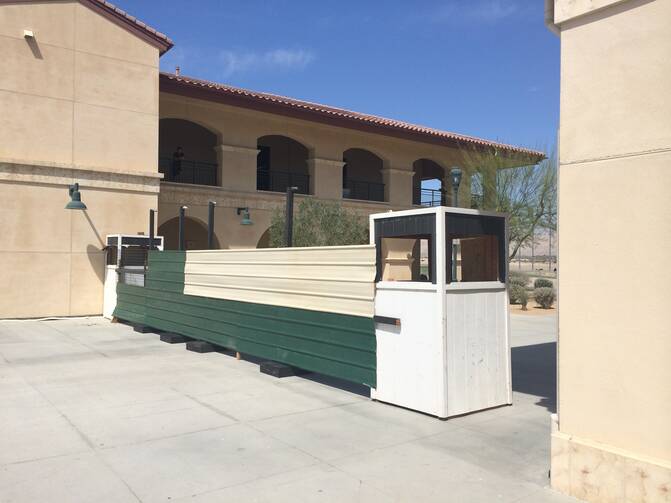This week, at the Jesuit high school where I work (Xavier College Preparatory, in Palm Desert, CA), colleagues and students built a wall, or at least a very large barrier. It was part of an activity to introduce students -- albeit remotely and in simple terms -- to what it might be like to be an immigrant; to desire to enter a newer, freer country and confront obstacles, procedures, and the demand for documents.
We built the wall as part of Xavier’s annual "Summit on Human Dignity,” which is a week of doing school differently. It’s a chance to immerse our community in one particular topic that requires critical ethical and spiritual reflection.
The Summits always carry a particular theme to anchor the discussion. This year, that theme was immigration.
The Summits are designed to accomplish a number of things, all of which center upon recognizing and protecting the dignity of the human being. The goal this week was not to advocate for a political perspective, but to advocate for persons. Our school and faculty recognize that people of good will can hold varying political goals and policy recommendations. With our week here, we sought to move beyond left and right, beyond MSBNC and Fox News, beyond the trite labels that obscure the human values and human longings at stake. We tried to critically assess the words we often use with this issue -- "illegal," "alien" "undocumented," "our country."
We invited students to engage the urgent questions of faith and justice, to help them sense the tensions and complexities of the fallen world. The Summit goals are nicely captured by a thought from former Jesuit Superior General Peter-Hans Kolvenbach. In a 2000 address at Santa Clara University on Jesuit higher education, Fr. Kolvenbach said:
We must therefore raise our Jesuit educational standard to "educate the whole person of solidarity for the real world." Solidarity is learned through "contact" rather than through concepts, as the Holy Father said recently at an Italian university conference. When the heart is touched by direct experience, the mind may be challenged to change. Personal involvement with innocent suffering, with the injustice others suffer, is the catalyst for solidarity which then gives rise to intellectual inquiry and moral reflection.Students, in the course of their formation, must let the gritty reality of this world into their lives, so they can learn to feel it, think about it critically, respond to its suffering and engage it constructively. They should learn to perceive, think, judge, choose and act for the rights of others, especially the disadvantaged and the oppressed.
Throughout the week, students heard from lawyers, priests, community organizers, border patrol agents, immigrants, parents and more. They learned about immigration law, immigration statistics, deportation proceedings, and life on the border. They watched movies and listened to songs and tried to understand the conditions of the men and women who risk lives and families to come to the United States, and how we (students, faculty, Americans) might respond with the charity and justice of the Good Samaritan.








